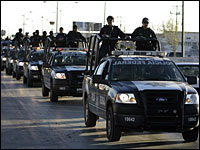
|  |  |  Editorials | Issues | March 2009 Editorials | Issues | March 2009  
White House Rallying To Combat Mexico's Drug War
 Brian Naylor - NPR.org Brian Naylor - NPR.org
go to original


| | Federal police arrive to patrol in Ciudad Juarez, Mexico, on March 2. The deployment is part of a 5,000-man troop increase planned for the city, which has been hit hard by organized crime-related violence. (AP) |  |
The drug-related violence in northern Mexico — and fears that it will spill into the U.S. — is a subject of increasing concern to the Obama administration.

The administration is expected to announce a multiagency effort to address the violence, which claimed more than 6,000 lives in Mexico last year. Secretary of State Hillary Clinton will travel to Mexico this week, and other administration officials will soon follow. President Obama is scheduled to meet with Mexico's president in Mexico by the end of March.

Already, kidnappings between Mexican drug gangs have spiked in Phoenix. Arizona's former governor, Janet Napolitano, now Homeland Security secretary, told reporters last week that the issue is "getting top attention in multiple departments of the U.S." According to Napolitano, "planning is well under way, and we are having extensive discussions with our federal colleagues within Mexico."

Napolitano said DHS, along with the Justice and Defense departments, is taking part in the planning. Among the options under consideration is sending more American security officers to the border, possibly from Immigration and Customs Enforcement, and the Bureau of Alcohol, Tobacco, Firearms and Explosives. Napolitano said a key concern is stopping the flow of arms from the U.S. into Mexico.

"What are some of the security equipment, things that we can put in the ports there that will help us better detect whether arms are being taken illegally into Mexico?" she asked.

Napolitano said officials are also determining how to go about "facilitating the tracing of guns that are actually used in crimes in Mexico."

But U.S. officials were dealt a setback last week when a state judge in Arizona dismissed a case brought against an arms dealer in Glendale who had been accused of selling some 700 guns through intermediaries to smugglers who sent them to Mexico.

Napolitano wouldn't comment on the case.

Another area of concern is stopping the flow of money south to Mexico and the flow of drugs north into the U.S.

Andrew Selee, director of the Mexico Institute at the Woodrow Wilson Center in Washington, said $15 billion to $20 billion has been streaming into Mexico because of the drug trade. He said sharing intelligence between the two nations is a key, "particularly identifying the trafficking routes for bulk cash, the main way that cartels are taking money back into Mexico, and also increasing our capacity to figure out who is selling arms illegally to cartels or who is exporting them illegally into Mexico."

The governors of two border states, Arizona and Texas, have asked that National Guard troops be allowed to patrol the borders. But Selee said that would be counterproductive, because it "would be interpreted in Mexico as a materialization of the border, correctly or not, and would likely get in the way of the cooperation."

The Department of Homeland Security has a contingency plan left on the shelf by the Bush administration to deal with a spillover of violence from Mexico. Napolitano said it needs changes, specifically more input from local officials. Nonetheless, Napolitano said the Obama administration is taking the threat seriously, and that "the only issue is at what level do we pull in the worst-case scenarios." Napolitano added, "We're not to the worst-case scenarios yet."

Napolitano will testify Wednesday at a Senate Homeland Security Committee hearing on the border violence. The panel's chairman, independent Sen. Joseph Lieberman of Connecticut, has already made it known that he thinks the Obama budget request for the agency needs to be increased to deal with the threat of spillover violence. |

 |
|  |



